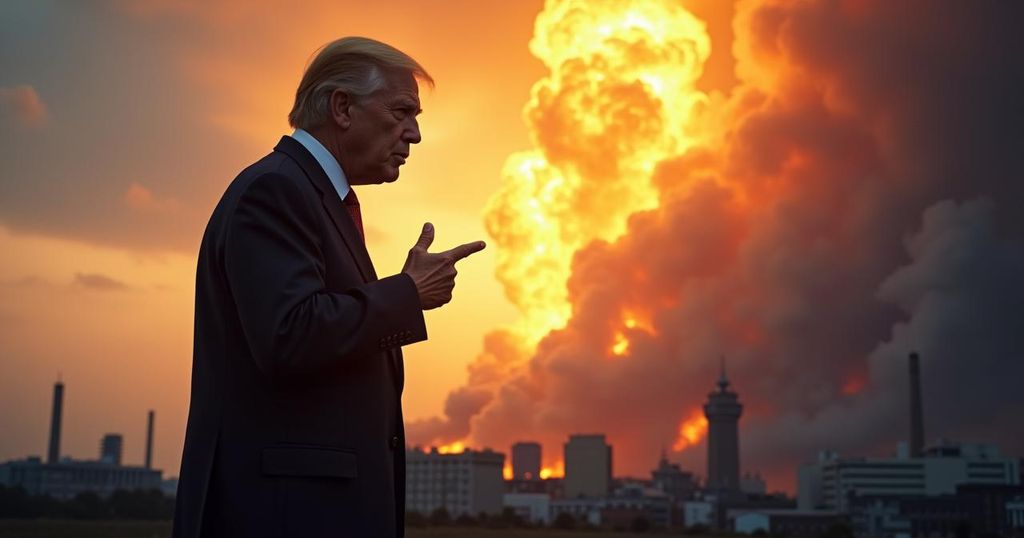JD Vance, during a vice presidential debate, dismissed climate change as “weird science” and expressed skepticism regarding the role of human carbon emissions in global warming, aligning with Donald Trump’s controversial claims about climate change being a scam. His stance contrasts with scientific consensus and comes in light of the devastation caused by Hurricane Helene, which has been linked to climate change impacts. Despite previously acknowledging climate issues, Vance’s current messaging reflects a significant shift towards skepticism in line with party politics.
During a recent vice presidential debate in New York City, JD Vance, the Republican nominee, characterized climate change as “weird science,” expressing skepticism towards the established scientific consensus that human activities, specifically carbon emissions, are the primary drivers of global warming. While addressing concerns about carbon emissions raised by his Democratic opponent Tim Walz, Vance stated, “This idea that carbon emissions drive all the climate change – let’s just say that’s true, just for the sake of argument so we’re not arguing about weird science…” This statement is at odds with scientific agreements, which indicate that human actions have been responsible for nearly all warming since the mid-20th century. Vance’s remarks come in the context of a significant meteorological event—Hurricane Helene, which devastated parts of the southeastern United States, resulting in numerous casualties. Just prior to Vance’s comments, former President Donald Trump also fueled controversy by labeling climate change as “one of the greatest scams of all time,” as he approached hurricane-affected communities in Georgia. Vance acknowledged public concerns regarding “crazy weather patterns” but emphasized a desire to advocate for clean air and water, positioning himself alongside Trump’s economic policies regarding manufacturing. He proclaimed, “The answer is you’d want to restore as much American manufacturing as possible and you’d want to produce as much energy as possible in the United States of America because we’re the cleanest economy in the entire world.” Yet, this assertion conflicts with global data indicating the United States, along with China, remains among the largest greenhouse gas emitters as of 2023. Vance’s position on climate change has evolved over the years; despite previously acknowledging a climate crisis in 2020, he has shifted towards a more skeptical view in alignment with Trump’s narrative. This skepticism persists despite overwhelming scientific warnings regarding the connection between climate change and severe weather phenomena. Federal Emergency Management Agency head Deanne Criswell recently linked the devastation caused by Hurricane Helene directly to the climate emergency, while former Vice President Al Gore remarked that the hurricane serves as a stark reminder of the critical impacts of climate change. Despite a significant portion of the American populace experiencing extreme weather events in recent years, climate change issues have not ranked as high a priority among voters compared to other pressing topics such as inflation and healthcare.
The discourse surrounding climate change has become increasingly polarized in the United States, particularly within political circles. The scientific community largely agrees that human activities, especially the combustion of fossil fuels, are the dominant force behind recent climate changes. This consensus asserts that rising temperatures are leading to more severe weather patterns, including hurricanes, floods, and droughts. However, figures in the Republican party, such as JD Vance and Donald Trump, have often dismissed scientific findings, framing climate change as a potential hoax or exaggeration. This shift in narrative appears to align with broader party talking points that favor deregulation and economic independence in energy production. Moreover, as climate events intensify and public concern grows, political strategies regarding climate change have become critical not just for policy-making but also for electoral processes.
In summary, JD Vance’s recent comments regarding climate change reflect a notable deviation from established scientific consensus, as he openly dismissed it as “weird science” during a vice presidential debate. His remarks echo former President Trump’s controversial stance on the issue, amidst significant public concern regarding extreme weather events, exacerbated by climate change. Vance’s changing narrative highlights the ongoing tension between scientific evidence and political rhetoric in the realm of climate policy, suggesting a need for informed dialogue surrounding this crucial global challenge.
Original Source: www.independent.co.uk






